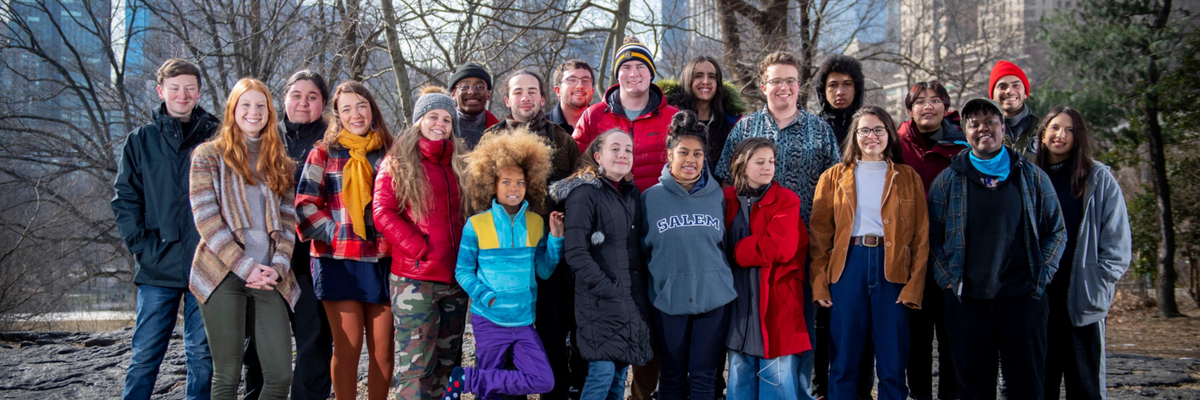"These youth have been politically targeted and persecuted, for over eight years, as the enormous power and machine of the Department of Justice singles them out among tens of thousands of other plaintiffs."

The 21 youth plaintiffs in the constitutional climate case Juliana v. United States pose for a photo in New York City.
(Photo: Our Children's Trust)
BRETT WILKINS
Feb 02, 2024
COMMON DREAMS
As the Biden administration seeks to derail a historic youth-led climate lawsuit against the U.S. government, plaintiffs in the suit—some of them now in their mid-to-late 20s—on Thursday moved to block the Department of Justice from further delaying the case.
Plaintiffs in Juliana v. United States filed a challenge to the Biden administration's bid for a stay in the case, calling the Justice Department's latest petition for a writ of mandamus "nothing short of shocking."
The DOJ's Justice Manual "provides that a writ of mandamus is an 'extraordinary remedy, which should only be used in exceptional circumstances of peculiar emergency or public importance,' the plaintiffs' filing notes. "The only emergency in this case is the climate emergency that defendants created and the Department of Justice prolongs with further delays."
"The true irreparable harm is the approximate cost of climate disasters or other climate economic harm since this case began and even since the first trial in this case was stopped in October 2018."
Nobel Prize-winning economist Joseph Stiglitz—a longtime backer of the plaintiffs—filed a declaration supporting their motion. Lambasting the DOJ's claim that the agency is "irreparably harmed" by having to dedicate human and financial resources to the trial, Stiglitz wrote that "to suggest the harm to children's health and homes and constitutional rights is worth less than the money the government has to spend to litigate a case is to suggest every case could be stayed only because it cost taxpayer dollars to litigate."
"The true irreparable harm is the approximate cost of climate disasters or other climate economic harm since this case began and even since the first trial in this case was stopped in October 2018 and through the end of 2023, along with any projections of the range of harm going forward," Stiglitz added, "as well as the amount the U.S. has spent (and continues to spend) subsidizing the fossil fuel industry."
Originally filed in 2015 when the plaintiffs were between 8 and 19 years old, Juliana v. United States accuses the federal government of violating young people's constitutional rights to life, liberty, and property, and argues that its actions contributing to the planetary emergency constitute a failure to protect essential public trust resources.
The Obama, Trump, and Biden administrations have all worked to kill the case, delaying trial by years. In 2018, the U.S. Supreme Court stopped the case from going to trial days before it was set to begin. On December 29, U.S. District Court Judge Ann Aiken ruled that the plaintiffs could proceed to trial, which was set to begin January 19. However, on January 18 the DOJ said it would file for a writ of mandamus.
The incessant delays have been accompanied by what the plaintiffs describe as "the most aggressive and discriminatory legal tactics" used against them by the government.
As the plaintiffs' latest filing explains:
These youth have been politically targeted and persecuted, for over eight years, as the enormous power and machine of the Department of Justice singles them out among tens of thousands of other plaintiffs, in an effort to stop our nation's youth from taking the witness stand, when every court to review the Juliana plaintiffs' claims has said that there is life and death at stake, the survival of the nation is at stake, and there is merit to their constitutional claims. All they seek after trial is a declaratory judgment of their rights and the government's wrongs, just as the students in Brown v. Board of Education did 70 years ago.
As Stiglitz concluded in his motion, "The federal government has expended taxpayer money taking the case up on appeal, rather
than allowing it to go to trial."
"The amount of time and money spent over the past six years seeking early appeals and mandamus has been large," he added. "We have already laid out the magnitude of the damages to the youth plaintiffs, their generation, and the public. In economic terms, and for the health of the nation, the balancing of potential harms is clear: This case should finally be decided at trial without further delay."

No comments:
Post a Comment